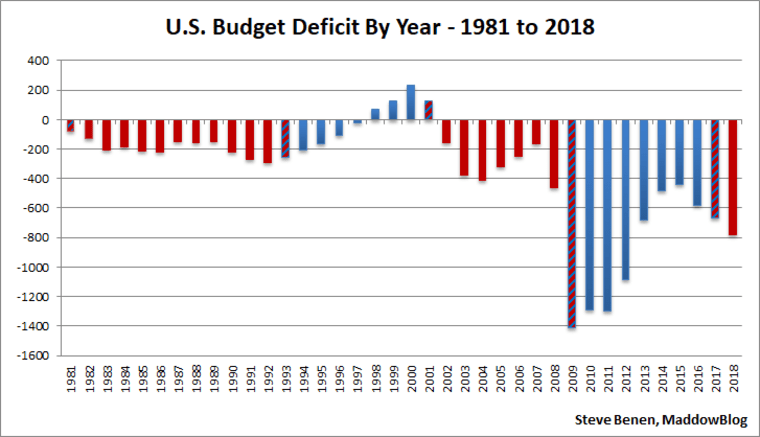
As recently as June, Larry Kudlow, the director of the Trump White House's National Economic Council, boasted to a national television audience the U.S. budget deficit "is coming down, and it's coming down rapidly."
Yeah, about that....
The U.S. government ran its largest budget deficit in six years during the fiscal year that ended last month, an unusual development in a fast-growing economy and a sign that -- so far at least -- tax cuts have restrained government revenue gains.The deficit totaled $779 billion in the fiscal year that ended Sept. 30, up 17% from $666 billion in fiscal 2017, the Treasury Department said Monday. The deficit is headed toward $1 trillion in the current fiscal year, the White House and Congressional Budget Office said.
This deficit is the fifth largest in modern American history -- in non-inflation adjusted terms -- and it now stands at 3.9% of GDP, up from 3.5% a year ago.
To be sure, as a percentage of the economy, the deficit isn't necessarily at a level that should cause significant concern. The trouble is the broader context:
Circling back to our previous coverage, there are a few key angles to this to keep in mind. The first is that Donald Trump’s campaign assurances about balancing the budget and eliminating the national debt should be near the top of the list of his broken promises.
Second, it’s now painfully obvious that the Republican Party, which spent the Obama era pretending to care deeply about fiscal responsibility and the terrible burdens deficits place on future generations, operated in bad faith.
And third, every Republican who said the GOP tax breaks for the wealthy would pay for themselves ought to face some renewed questioning about how very wrong they were.
As we discussed several months ago, I should emphasize that I’m not a deficit hawk, and I firmly believe that larger deficits, under some circumstances, are absolutely worthwhile and necessary.
These are not, however, those circumstances. When the economy is in trouble, it makes sense for the United States to borrow more, invest more, cushion the blow, and help strengthen the economy.
The Trump White House and the Republican-led Congress, however, decided to approve massive tax breaks for the wealthy and big corporations when the economy was already healthy – not because they were addressing a policy need, but because they were fulfilling an ideological goal.
Economic growth is healthy and unemployment is quite low. This is exactly when we should see the deficit shrinking. Instead, it's growing -- and it's on track to keep growing in the coming years.
Worse, now that the deficit is spiraling, those same Republicans who pretended to care about "fiscal responsibility" have decided that what the nation really needs is more tax breaks -- none of which will be paid for -- and cuts to Medicare and Social Security.
Given how close we are to the midterm elections, GOP officials and candidates will have to hope voters don't hear about this.
You'll find a chart above to help drive the point home. Red columns point to Republican administrations, blue columns point to Democratic administrations, and red-and-blue columns point to years in which the fiscal year was split between presidents from two different parties.